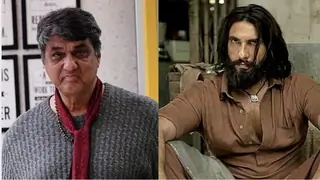Originally posted by: narumugaye
First off, though not to the point of this thread, the interview itself sounds suspect. The factual inaccuracy aside (Rahman was never associated with Asoka - Anu Malik helmed that venture), some of the statements attributed to him ("...i've dared to introduce new voices...") sound concocted, and very much against his humble and soft-spoken nature. In fact, it sounds exactly like something Anu or HR would say; but that's besides the point and let's get on with the discussion.
Q. Why does a composer sound repetitive?
Mostly perhaps a particular formula works (usually in the short run). And B'wood is ultimately a money-making enterprise, so if it sells, make more of it! Not too different from the films themselves are they? But it could also be due to pressures from the producer or actor (again coming down to commercial considerations). The third reason: maybe he knows no other way!
I think we need clarity on what's being implied by 'repetitive'. Whether it has to do with copying or rehashing earlier numbers - perhaps the most irksome for music lovers. But if it has to do with a particular style of composing, preference for instruments, 'repetitive' may not be the right word. More like the composer's signature - and surely Rahman has a strong signature; extensive use of bass guitars, harmony, string sections, unique sound effects, loops, etc and above-all, enchanting melodies, entrancing rhythms and brilliant sound engineering and mixing. These leitmotifs make Rahman's compositions standout from the morass of Bollywood numbers, and, IMHO, cannot be classified as being repetitive.
Although the interview claims to have Rahman admit to being repetitive, as someone who has listened to him from day one in all the languages he has composed in, while, yes he composed several 'dance numbers' (notably for Prabhu Deva films), they are not copies or rehashes of each other - there exist in them enough variety, experimentation and novelties so as to have only the genre of 'dance numbers' (if there's indeed such a genre!) as a commonality. In recent times (from Taal in 2001 to Rang De Basanti in 2006) I doubt any serious music lover can claim ARR to be repetitive. The contrast with HR, Anu Malik, Pritam, Nadeem-Shravan et al (S-E-L and Vishal-Shekhar excluded for the time being) are stark enough for all to see.
Q. When does a composer sound repetitive?
My guess is when there are time pressures - he signs on several films and sooner or later the work piles up; he may not realize it at the time of composing (caught up with 'completing it somehow' as it is), but the album reaches the listener over a staggered period of time, and they all end up sounding the same. Composers also go through certain phases such as a passing fancy for a certain instrument, sound effect, or rhythm progression, and in their excessive love for it may end up using it across several albums. Again the problem arises because the albums may be released around the same time or across several months - both could lead to claims of being repetitive. It's really a Catch-22 situation. My take on this is for genuine composers to limit themselves 4 - 5 projects a year, tune their compositions strictly to the spirit of the film (hopefully they'll accept only good scripts!) without too much of an eye on commercial success, and be true to themselves. Even the oft-reviled Anu Malik sounded good in films like Asoka, Border and LOC, movies that were relatively stronger in script than the usual B'wood mess.
Q. Do you think ARR is repetitive?
I have spoken about this earlier in this post (a composer's signature, passing phase). My answer is a clear no. But I would also like to add a couple of other aspects: one is of the Raaga used; obviously songs based on the same raaga are bound to share similar refrains. Composers such as ARR (and the greats of the yesteryears) nevertheless manage to make it sound different through innovations such as re-ordering some of the notes or adding a dash of spice from another raag, pitching it differently, and of course, overhauling the structure of the composition. To claim a composer is repetitive because some notes are similar is in all probability, sheer folly.
The other aspect is genre: folk music has several underlying traits that are bound to manifest (indeed has to as that's what lends it its distinct flavour) in all folk songs. Hai Na (Zubeidaa), Mahi Ve (Legend of Bhagat Singh), O Re Chhori (Lagaan) all exhibit several similar traits cos they belong a common genre. So once again, confusing genre with being repetitive is perhaps not apt.
Thanks, nsinha, for initiating this thread!
































